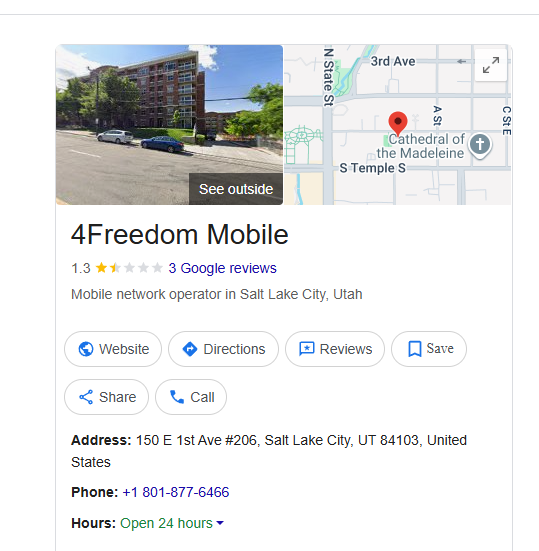4Freedom entered the secure phone service industry in 2021 with bold promises—strong encryption, complete anonymity, and comprehensive coverage across all three major U.S. carriers (AT&T, Verizon, and T-Mobile).
Fast-forward four years, and the once-ambitious service seems to be on the brink of collapse. As of this writing, buying a subscription looks impossible, and existing users are getting a "critical system failure" notification across the board.
So, what went wrong? As it turns out, a lot—and this 4Freedom review will explain exactly how a promising service met an unfortunate fate. You’ll learn:
- Whether 4Freedom is discontinued
- What happened to the service
- What it promised (and what the reality looks like)
- Which 4Freedom alternative to consider
Did 4Freedom Discontinue Service?
4Freedom hasn’t made any official announcement regarding a shutdown, but it seems like it’s only a matter of time before we see one. The service has been all but discontinued, as evidenced by a few clear-cut signs of its collapse.
First, there’s been a sharp rise in customer complaints. One subscriber said they hadn’t had service for over three weeks, “essentially paying for nothing.” They also reported frequent disruptions and lackluster support for over three years they’d spent with the service, deciding to leave it altogether.
Another reviewer seems to have received an official notice of discontinuation after reaching out to 4Freedom. The service’s email response was allegedly as follows:
“We’ve encountered a critical system failure and, after an internal review, we will be discontinuing operations for now. While service is no longer available, we are committed to supporting customers during the transition.”
This response isn’t definitive proof that 4Freedom is out of business, but the direction in which the service is going is clear enough.
4Freedom’s offices claim to be open 24/7. Still, it doesn’t seem like the business is operational.
If you look at 4Freedom’s website, you’ll see clear evidence that they’re not allowing new subscriptions. Clicking any of the action buttons, such as “Buy Now” or “Take the 4Freedom Challenge!” brings you back to the homepage, making it impossible to subscribe to the service.
What Happened With 4Freedom Mobile?
4Freedom tried to build and manage every aspect of a secure mobile ecosystem by being:
- Phone manufacturer
- Mobile virtual network operator (MVNO)
- Software provider
While this goal is certainly commendable, especially given the massive security and privacy issues associated with Big Telco, it may have been too ambitious for a company without an outstanding amount of time and funding to sustain it in the long run. Even the more established industry players would likely have a hard time executing on everything 4Freedom wanted to accomplish.
In short, the company tried to do too much, too soon, and with too few resources.
4Freedom attempted an innovative approach to nationwide secure coverage. Instead of traditional agreements like major carriers, it used a foreign carrier’s SIM profile (from O2 UK) that roamed on U.S. networks.
This approach was unveiled by a Reddit user who analyzed an eSIM from Volta Wireless, which 4Freedom acquired in 2023.
While this clever workaround helped 4Freedom deliver on its promise of cross-carrier compatibility, it meant the service was built on a shaky foundation. Roaming on partner networks often meant low priority or inconsistent service, which wasn’t only a theoretical issue but a common one reported by many users.
On the software end, 4Freedom tried offering:
- A hardened version of Android (4Freedom OS)
- A secure VPN service
- An encrypted app through which all traffic would be routed for complete privacy
All of this, combined with nationwide coverage and unlimited roaming, required an astonishing amount of resources, and 4Freedom couldn’t keep up. What started out as an admirable goal turned out to be a set of unreliable, unfinished, and ultimately unsuccessful services.
4Freedom Mobile Review: An Ideal Mobile Service Provider, on Paper
To get a better understanding of where things fell short, we’ll explore the expectations and the reality of its core offerings:
- Privacy and security
- Network coverage
- Plans and pricing
- Hardware and OS
1. Privacy and Security
Privacy is (or was) 4Freedom’s main selling point, and it seems the company didn’t disappoint in this area. The advertised privacy and security features include:
- Anonymity ensured by a lack of personal data needed to sign up
- No communication and location tracking or logging
- Encryption of texts, voice calls, and video calls
The service’s encryption solution has a unique twist—4Freedom offers a data-only SIM, so all texts and calls are made through an encrypted app instead of the actual mobile network. For added privacy, 4Freedom offers a VPN that shields your online activity when using WiFi.
Based on user experiences, 4Freedom delivered on its promise of privacy. There are no known reports of privacy or data breaches, though its relatively small user base could mean some issues went unnoticed or undiscovered.
However, the implementation of 4Freedom’s privacy features came at a major cost—network reliability.
2. Network Coverage
4Freedom’s data-only SIM has its security and privacy benefits, but it undermines the main purpose of a cellular carrier—reliable nationwide communication. While the practice of roaming on U.S. networks instead of partnering with them may sound clever in theory, it didn’t quite work in practice.
Specifically, the 4Freedom SIM is meant to switch between all three major carriers depending on the strongest signal. This would hypothetically eliminate dead zones even in rural areas, which not many MVNOs can do.
Unfortunately, it seems like 4Freedom can’t, either. Poor network reliability is among the most commonly reported issues, with users complaining about:
- Sudden network outages
- Random call drops
- Non-U.S. IP addresses for their data
One user even reported not being able to make phone calls of any kind, including emergency services. 4Freedom reportedly took almost a month to resolve the issue, leaving the subscriber without the service they signed up for.
The frequency and severity of these alarming limitations seemed to increase with time, eventually leading to the service malfunctioning altogether. Users would spend weeks and months without coverage before the rumors of complete discontinuation started surfacing.
3. Plans and Pricing
4Freedom offers flexible pricing, but the more you scratch the surface, the less appealing the plans get. You can choose between two no-contract options with unlimited calls and text, the only difference being in the amount of data:
Although the higher-priced tier promises unlimited data, it’s slightly misleading because it’s not actually free unlimited data. You’re essentially paying over $20 for 10 GB instead of 1 GB, and you still need to pay extra for each GB you use afterwards.
The contract-based plan isn’t any better. For $49.99/per month, 4Freedom promises unlimited talk, text, and high-speed data (including roaming in over 200 countries). Still, if you read the fine print, you’ll notice that high-speed roaming is only available in around 80+ countries, so the speed will likely be throttled in the rest.
To make the plan more cost-effective, 4Freedom offers it at $29.99 per month with a three-year commitment. As attractive as the discount may seem, it comes with a major vendor lock-in issue. Customers who opted for this plan and ended up disappointed with the service had to keep paying for it anyway.
4. Hardware and OS
To go beyond a secure phone service, 4Freedom ventured into hardware with its 4Freedom Secure Phone. The idea was simple—build a secure phone from the ground up to ensure the hardware and OS match the privacy-focused cellular features.
On paper, this resulted in some commendable specifics:
- Security-hardened custom hardware
- Controlled manufacturing to ensure there’s no bloatware or spyware
- A de-Googled Android OS
For as little as $399 with qualifying plans, the phone was advertised as a cost-effective solution for security-conscious users. Unfortunately, it doesn’t seem like the phone got the desired attention.
While some users expressed their excitement, there aren’t enough hands-on experiences shared that could verify 4Freedom’s claims about its hardware. Combined with the downfall of the company’s cellular service, this makes the Secure Phone’s adoption highly unlikely.
4Freedom Pros and Cons
As 4Freedom is on the verge of discontinuation, its benefits and drawbacks are more a distinction between the expectations and reality:
All in all, what was meant to be a one-of-a-kind ecosystem with unique security features ended up being a flawed service that will most likely cease all operations. Unless we see a major shift, existing users will need to look for another secure phone service.
The good news is that there are a few great alternatives that cater to privacy-conscious users without any trade-offs. If you need a recommendation, check out Cape.
Cape: A 4Freedom Mobile Alternative
Cape is a secure cellular service built on a minimal-trust model: we don’t ask you to trust us with sensitive data, because we don’t collect it in the first place. That way, your communications and identity remain under your control.
Unlike traditional carriers—or light MVNOs like 4Freedom that rely entirely on host infrastructure—Cape operates as a heavy MVNO. This means that while we still lease access to physical towers, we run our own cloud-based mobile core and SIM cards, giving us full control over privacy and security. This design eliminates legacy vulnerabilities and enables stronger safeguards across the network. Cape protects you from:
- Malicious actors targeting telecom systems
- Traditional carriers that monetize user data
- Advertisers and affiliates that profile users
All you need to sign up is your phone number. By not storing personal details like your name, address, or Social Security number, Cape ensures your privacy isn’t something that can be stolen.
On top of its core infrastructure, Cape offers multiple built-in security measures to safeguard your data and communication:
Cape offers all of the above alongside unlimited text, calls, and 4G/5G data through a $99/month plan. All municipal, state, and federal taxes are included, so you don’t have to pay any hidden fees.
Besides transparency, Cape ensures there’s no vendor lock-in. There are no contracts, and you can cancel your subscription anytime.
Get Started With Cape
If you have an eSIM-enabled device, you can sign up for Cape in minutes by visiting this page and either porting in your existing number or choosing a new one.
To further enhance your privacy, Cape has partnered with Proton to offer all Cape subscribers Proton Unlimited or Proton VPN Plus for just $1 for six months.


